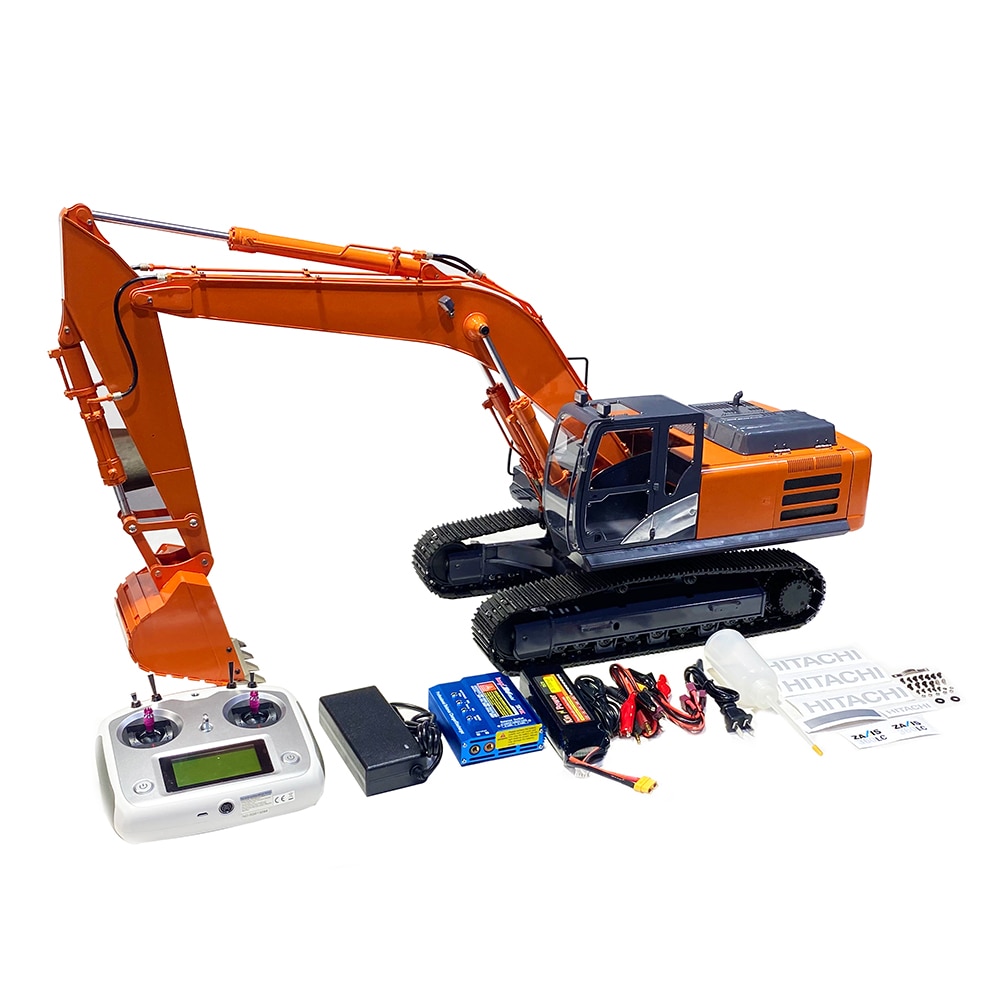Recognizing Exactly How Excavator Works and Its Effect On Efficiency
Excavators play a vital function in building and mining procedures, counting on a complex interplay of mechanical and hydraulic systems. Their capability to execute a selection of jobs rests on both their style and the modern technology incorporated within. Understanding these components can substantially influence functional effectiveness and efficiency. As developments remain to improve the industry, one should think about exactly how these modifications will certainly affect future techniques and performance.
The Essentials of Excavator Mechanics

The Duty of Hydraulic Solutions in Excavators
At the heart of excavator procedure lies the hydraulic system, which plays a critical function in powering the equipment's functions and motions. This system utilizes pressurized hydraulic fluid to transfer power, enabling different activities such as swinging, digging, and training. By taking advantage of the principles of hydraulics, excavators can carry out tasks with impressive precision and force, enhancing overall functional efficiency.The hydraulic system includes vital parts, consisting of cylinders, pumps, and shutoffs, which function together to regulate the flow and instructions of the fluid. When the driver engages the controls, the hydraulic liquid is routed to specific cylinders, equating the operator's commands into physical motion. This mechanism permits smooth and responsive actions, which are crucial in building and construction and excavation settings. double e volvo rc excavator. The efficiency of the hydraulic system directly affects the productivity and adaptability of the excavator, making it an essential element in modern excavation processes
Trick Elements of an Excavator
Comprehending the crucial elements of an excavator is crucial for comprehending how this powerful machine runs. An excavator is composed of a number of considerable elements, consisting of the undercarriage, residence, arm, bucket, and boom. The undercarriage supplies stability and movement, commonly featuring tracks or wheels to navigate different terrains. Your home contains the engine and hydraulic systems, enabling the operator to control movement and power the equipment. The boom prolongs from your home, making it possible for vertical reach, while the arm links to the bucket, helping with excavating and lifting operations.Additionally, the cab houses the driver, geared up with controls for precise maneuvering. Each of these parts plays an essential duty in the excavator's general functionality, contributing to its effectiveness and effectiveness on building and construction websites. Understanding these components helps in maintaining and maximizing excavator efficiency, ensuring jobs are finished safely and effectively.
Add-on Flexibility and Its Benefits
Add-on flexibility is a necessary element of excavators, making it possible for drivers to switch between numerous devices customized for specific tasks. This versatility not just improves work efficiency however additionally adds to cost-effectiveness by reducing the demand for numerous makers. Understanding the different kinds of attachments available can considerably affect the general efficiency and performance of an excavator on job sites.
Kinds of Add-ons
While excavators are primarily recognized for their digging capabilities, their true flexibility lies in the broad range of attachments offered. These accessories improve the excavator's capability, permitting it to execute numerous jobs past excavation. Usual add-ons consist of pails (for digging and scooping), hydraulic thumbs (for understanding materials), and augers (for drilling holes) Grapples are made use of for moving and taking care of particles, while rippers can separate difficult surfaces. Other specialized attachments, such as plates and rakes, enable excavators to adjust to particular job needs. This diversity not only enhances the equipment's energy across different industries, consisting of building and construction, demolition, and landscape design, but additionally enables operators to tailor their devices to fulfill specific job needs efficiently.
Raised Job Efficiency
Optimizing work effectiveness is a key advantage of making use of different excavator attachments. Various accessories enable an excavator to execute multiple jobs without needing to switch equipment, conserving beneficial time and labor. As an example, making use of a hydraulic hammer can damage concrete while a pail accessory can excavate dirt, allowing a seamless operations. This convenience lowers downtime associated with tools adjustments and enhances efficiency on-site. In addition, specialized add-ons enhance accuracy in tasks such next as grading or landscaping, causing greater quality end results. The ability to adapt to different task demands not only simplifies operations yet additionally decreases the need for extra equipment, making sure that projects are finished quickly and effectively. Overall, accessory adaptability considerably adds to enhanced task performance in excavation job.
Cost-Effectiveness and Versatility
Cost-effectiveness is a considerable advantage of making use of functional excavator accessories. These accessories permit a solitary excavator to perform multiple tasks, decreasing the requirement for extra machinery and labor - double e volvo rc excavator. By switching between pails, hammers, and grapples, drivers can tackle different jobs, from excavating to demolition, consequently taking full advantage of equipment usage. This flexibility not just lowers functional expenses yet also decreases downtime associated with transforming equipment. Additionally, the ability to tailor excavators with specialized attachments enhances efficiency, as they can effectively handle diverse jobs according to project demands. To conclude, the mix of cost-effectiveness and versatility in excavator accessories adds to enhanced operational performance and resource allotment in building and excavation projects

Advanced Technology in Modern Excavators
Modern excavators are significantly equipped with sophisticated technology that changes excavation processes. Automation simplifies procedures, while enhanced gas performance reduces operational costs. Additionally, wise control systems boost accuracy and safety, marking a significant advancement in excavation tools.
Automation in Excavation Processes
As excavation modern technology evolves, automation has actually become a critical part in enhancing performance and precision on job websites. Modern excavators are equipped with sophisticated automated systems that promote jobs such as grading, digging, and trenching with marginal operator intervention. These systems make use of sensors, GPS, and artificial intelligence algorithms to assure precise placing and depth control, substantially decreasing the margin for error. Furthermore, automation allows operators to concentrate on critical decision-making instead than manual controls, leading to improved productivity overall. Such advancements not just streamline process however additionally boost safety by reducing human mistake in complex operations. As a result, the integration of automation in excavation procedures stands for a significant innovation in construction technology, driving the market in the direction of higher effectiveness and effectiveness.
Boosted Fuel Efficiency
Improvements in innovation have additionally resulted in significant improvements in gas performance for contemporary excavators. Modern machines are outfitted with advanced engines that maximize power output while decreasing fuel consumption. These engines use cutting-edge combustion modern technologies, such as turbocharging and direct gas shot, to boost performance and effectiveness. In addition, light-weight products in building and construction lower overall weight, permitting much less energy expense throughout procedure. The intro of variable speed controls allows drivers to adjust engine performance according to particular tasks, better minimizing fuel use. Because of this, these enhancements not only reduced functional prices however additionally sites add to environmental sustainability by reducing discharges. In general, enhanced fuel efficiency in excavators is a crucial growth that bolsters efficiency and economic viability in the building market.
Smart Control Equipment
While drivers browse significantly intricate job sites, clever control systems in excavators have become essential devices for improving efficiency and accuracy. These innovative innovations utilize sensing units and formulas to keep an eye on numerous criteria such as lots weight, terrain problems, and functional efficiency. By automatically changing hydraulic features, smart systems maximize equipment performance, leading to enhanced performance and lowered wear on elements. Furthermore, drivers take advantage of intuitive user interfaces that give real-time comments and diagnostics, allowing for educated decision-making. This assimilation of innovation not just simplifies operations yet likewise decreases human mistake, adding to safer workplace. As the building and construction industry proceeds to advance, smart control systems will certainly play an important duty fit the future of excavator effectiveness and efficiency.
Enhancing Functional Performance With Excavators
Excavators play a crucial function in improving functional efficiency throughout different building and construction and excavation projects. Their convenience click over here now permits for multiple tasks, including digging, lifting, and product handling, which streamlines operations and decreases the demand for added equipment. With powerful hydraulic systems, excavators can carry out durable jobs with precision, significantly lowering the moment needed to full jobs. The combination of advanced technology, such as GPS and automated controls, further enhances their operation, enabling operators to achieve greater accuracy and decrease product waste. Furthermore, modern excavators are designed to eat less fuel and minimize emissions, adding to both expense savings and ecological sustainability. By using excavators effectively, building groups can boost efficiency, satisfy job target dates, and enhance overall site monitoring. This multifunctionality and effectiveness make excavators crucial devices in the contemporary construction landscape.
The Future of Excavators in Construction and Mining Industries
As the building and mining sectors advance, the future of excavators is poised for substantial change driven by technical development and altering functional demands. Developments in automation and expert system are reshaping excavator abilities, enabling enhanced precision and efficiency in operations. Independent excavators are emerging, lowering the demand for human intervention and lessening the threat of accidents.Moreover, the integration of telematics and IoT innovation enables real-time monitoring of machine performance and predictive upkeep, maximizing uptime. Eco-friendly layouts, consisting of electrical and hybrid models, are acquiring grip, straightening with sustainability goals within the industry.Additionally, the use of sophisticated products and lighter designs enhances fuel effectiveness while preserving performance requirements. As these patterns progression, excavators will play an important function in satisfying the raising needs for productivity and safety and security in building and mining, ultimately transforming functional landscapes.
Frequently Asked Inquiries
Just How Do Climate Condition Impact Excavator Performance?

Weather substantially affect excavator performance, as rainfall and mud can hinder traction and stability, while extreme temperature levels might impact hydraulic systems. Operators has to adjust to these variables to assure suitable functionality and security throughout procedures.
What Safety And Security Procedures Should Operators Comply With While Utilizing Excavators?
Precaution for excavator operators include putting on proper personal safety devices, carrying out pre-operation examinations, making sure correct interaction with ground workers, keeping a secure distance from above dangers, and adhering to well established functional protocols to prevent accidents.
Exactly How Usually Should Excavators Be Kept for Ideal Efficiency?
Excavators should be kept consistently to ensure peak efficiency, generally every 250 operating hours or as specified by the maker. Regular checks improve dependability, prevent unexpected failures, and extend the life expectancy of the equipment.
What Is the Average Life Expectancy of an Excavator?
The average life expectancy of an excavator generally ranges from 10,000 to 15,000 hours of procedure. Variables affecting longevity consist of maintenance practices, operating problems, and the high quality of the equipment itself, affecting overall efficiency and performance.

Can Excavators Operate Uneven Terrain Successfully?
Excavators can run effectively on irregular terrain as a result of their articulated styles and flexible tracks. These functions allow them to preserve security and grip, making it possible for reliable procedure in difficult atmospheres commonly encountered in building and construction and landscaping tasks. Each of these parts plays a crucial function in the excavator's total capability, adding to its performance and effectiveness on building sites. Maximizing job effectiveness is a primary advantage of utilizing numerous excavator attachments. While operators browse progressively complex task sites, smart control systems in excavators have arised as important tools for enhancing efficiency and accuracy. Excavators play an important function in boosting functional effectiveness across different building and construction and excavation tasks. Breakthroughs in automation and synthetic intelligence are reshaping excavator capabilities, allowing for enhanced precision and performance in procedures.